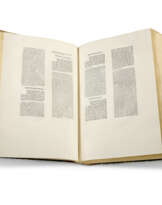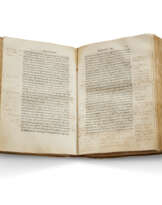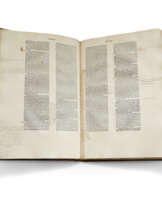ID 1471934
Lot 11 | De animalibus
Estimate value
$ 70 000 – 100 000
First edition of the first printed text on biology. Aristotle’s De animalibus comprises his three main zoological works: De historia animalium, De partibus animalium and De generatione animalium. They form the first collection of biological treatises ever printed. None of these texts were included in the Opera until the Aldine Greek edition of 1495–98. They contain “an immense collection of biological data—anatomical, physiological, behavioral—on over five hundred species of animals" (Grolier Medicine).
Theodorus Gaza was a leading Classical scholar, and it was through studying his translation of the present texts, along with the Greek originals printed in the Aldine Opera, that Aldus Manutius recommended learning Greek. Goff A-973; BMC V, 232; GW 2350; HC *1699; BSB-InkA-678; Bod-inc A-390; Klebs 85.1; Osler Incunabula medica 106; Garrison-Morton 274, 275, 462; Grolier Medicine 2A; Osler 239; Stillwell Science 573; Waller 16; Wellcome 42; ISTC ia00973000.
Chancery folio (315 × 210mm). 250 leaves (of 252, without the first and final blank). Initial spaces with printed guide-letter (first leaf and t1 lightly soiled, very occasional light spotting or small stain, a few very small marginal repairs). Contemporary Italian blindstamped calf over bevelled wooden boards, panelled tooled with knot, X, quatrefoil and rosette tools and punches [tools not in De Marinis], evidence of title written along fore-edge (rebacked, upper board detached, a little worn at extremities, missing two fore-edges clasps, scuffed, a few wormholes). Provenance: contemporary Italian foliation, headlines, chapter numbers and occasional annotation in several early hands – scientific instrument used for geometry/astronomy drawn at corner of aa9v, compass trials drawn in margin of r9v – Howard Lehman Goodhart (1884-1952; leather label; gifted to his daughter:) – Phyllis Goodhart Gordan (1913-1994; leather label); by descent.
| Artist: | Aristotle (384 BC - 322 BC) |
|---|---|
| Place of origin: | Italy |
| Auction house category: | Medicine & science, Printed books |
| Artist: | Aristotle (384 BC - 322 BC) |
|---|---|
| Place of origin: | Italy |
| Auction house category: | Medicine & science, Printed books |
| Address of auction |
CHRISTIE'S 8 King Street, St. James's SW1Y 6QT London United Kingdom | |
|---|---|---|
| Preview |
| |
| Phone | +44 (0)20 7839 9060 | |
| Buyer Premium | see on Website | |
| Conditions of purchase | Conditions of purchase |













